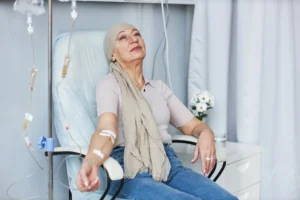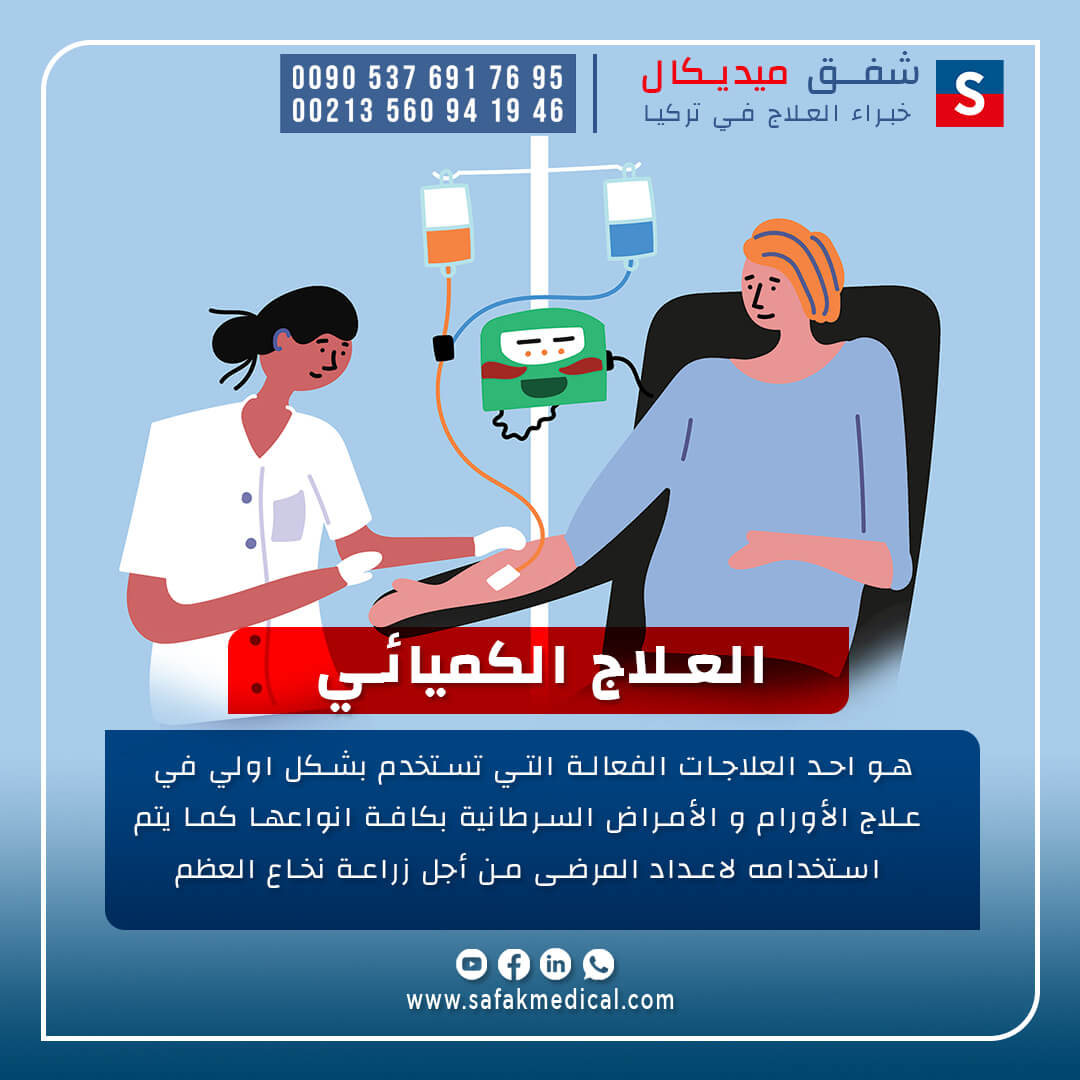Chemotherapy in Turkey
Chemotherapy in Turkey, as well as globally, is one of the effective treatments primarily used for various types of cancer, as well as for other medical conditions. It is also used to prepare and condition patients for certain treatments, such as bone marrow transplants.
Chemotherapy involves a combination of potent chemical drugs that can be used alone as a primary treatment or with a combination of other drugs. In this article, we will provide medical details about chemotherapy, its uses, side effects, and other important information for patients undergoing this treatment.

Table of Contents
If you are interested in traveling for cancer treatment, please contact us, and we will guide you to the best hospitals with the highest success rates and lowest treatment costs. All you need to do is reach out to us.
Get a Medical Diagnosis
Watch the video
Medical Information About Chemotherapy:
What is Chemotherapy?
Chemotherapy is an aggressive form of drug treatment aimed at destroying rapidly dividing cells in the body. It is commonly used to treat cancer, as cancer cells grow and divide faster than normal cells.
Chemotherapy in Turkey is often combined with other treatments such as surgery, radiation therapy, hormone therapy, or immunotherapy. The combination of these treatments depends on:
- The stage and type of cancer the patient has
- The overall health of the patient
- Previous cancer treatments the patient has undergone
- The location of the cancer cells
- The patient’s personal treatment preferences
Why is Chemotherapy Used?
Chemotherapy is primarily used for:
- Reducing the total number of cancer cells in the body
- Reducing the likelihood of cancer spreading
- Shrinking the size of tumors
- Alleviating current symptoms
If a patient has undergone surgery to remove a cancerous tumor, such as a breast cancer lump removal, the oncologist may recommend chemotherapy to ensure any remaining cancer cells are destroyed.
Chemotherapy is also used to prepare a patient for other treatments. For example, it may shrink the tumor so that it can be surgically removed, or it may prepare the patient for radiation therapy.
In late-stage cancer, chemotherapy may help relieve pain.
In addition to cancer treatment, chemotherapy can be used to prepare individuals for bone marrow stem cell treatments. It can also be used in much smaller doses to help treat autoimmune disorders, where the immune system attacks healthy cells, such as lupus or rheumatoid arthritis. Chemotherapy is also used for bone marrow diseases.
What Are the Side Effects of Chemotherapy?
Chemotherapy is designed to kill rapidly dividing cancer cells. While cancer cells divide quickly, other cells in the body do as well and can be negatively affected by chemotherapy. These cells may include those found in:
- Blood
- Hair
- Skin
- Lining of the gastrointestinal tract
As a result, chemotherapy side effects can include:
- Easy bruising and excessive bleeding
- Diarrhea
- Dry mouth
- Fatigue
- Nausea
- Vomiting
- Hair loss
- Loss of appetite
- Fever
- Mouth sores
- Pain
- Constipation
Many of these side effects can be prevented or treated, and most resolve once the treatment is completed.
Long-term and Delayed Side Effects:
Chemotherapy drugs may cause long-term side effects that may not appear until months or years after treatment. These delayed side effects can vary depending on the chemotherapy drug used but can include:
- Lung tissue damage
- Heart problems
- Infertility
- Kidney problems
- Nerve damage (peripheral neuropathy)
- Increased risk of developing a second cancer
How is Chemotherapy Administered?
Chemotherapy can be given in different ways, including:
- Chemotherapy Injections: Typically given through an intravenous (IV) line, the medication is administered by inserting a needle into a vein in the arm or through a device in a vein in the chest.
- Chemotherapy Pills: Some chemotherapy drugs are taken in pill form, either as tablets or capsules.
- Chemotherapy Injections: Chemotherapy medications may also be injected directly with a needle, similar to receiving a regular injection.
- Chemotherapy Creams: Chemotherapy drugs can be applied as creams or gels on the skin to treat specific types of skin cancer.
- Localized Chemotherapy: Chemotherapy can be delivered directly to one area of the body, such as the abdomen, chest cavity, or central nervous system.
- Chemotherapy Directly to the Cancer: Chemotherapy can be applied directly to the tumor site, either during surgery or after surgery. For instance, small discs containing chemotherapy drugs can be placed near the tumor during surgery. These discs dissolve over time, releasing chemotherapy drugs.
How Often is Chemotherapy Given?
The number of chemotherapy treatments a patient receives depends on the drugs being used, the characteristics of the cancer, and how well the patient’s body recovers after each treatment. Chemotherapy schedules can vary. Treatment may be continuous or alternate between treatment periods and rest periods to allow the body to recover.
How Should Patients Prepare for Chemotherapy?
It’s important for patients to plan ahead before starting chemotherapy. Doctors and hospital staff in Turkey will help anticipate potential issues related to this treatment. Before starting chemotherapy, the patient will undergo a series of tests to determine if they are healthy enough to begin treatment. These tests will likely include heart exams and blood tests to assess liver health. These tests can also help guide the doctor in selecting the right chemotherapy treatment.
The doctor may also recommend a dental check-up before treatment, as chemotherapy can impair the body’s ability to heal. Infections in the gums or teeth can spread throughout the body.
If chemotherapy is administered through an IV line, the doctor may insert a port (a device implanted in the body near the chest) to make accessing veins easier and less painful. During each treatment, the chemotherapy medication will be delivered through this port.
What Should Patients Expect After Chemotherapy?
The patient’s oncologist and cancer care team will regularly monitor the effectiveness of the treatment. This may involve imaging techniques, blood tests, and more. The doctor can adjust the treatment as needed.
The more the patient communicates with their doctor about how chemotherapy is affecting them, the better the overall experience.
Patients should inform their doctor about any side effects or issues related to the treatment, so adjustments can be made if necessary.
For more information about chemotherapy sources in Turkey, please visit:
- HealthLine
- MayoClinic
🎗️

